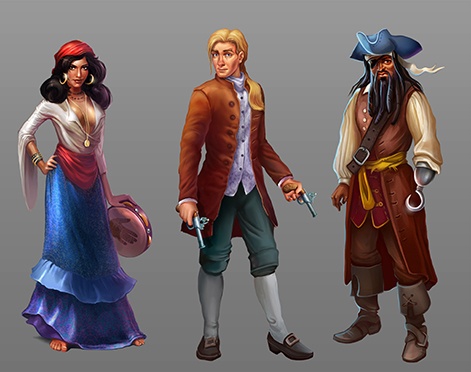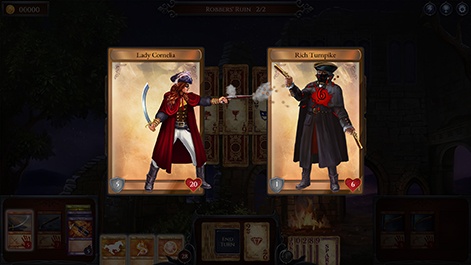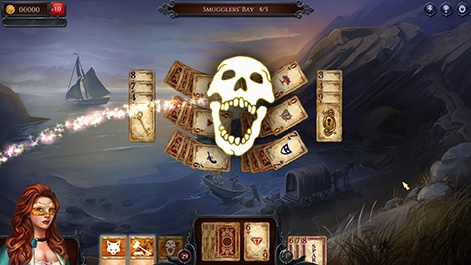After launching on December 7th, Shadowhand generated more gross revenue in its first month than the studio's previous title Regency Solitaire made in its lifetime.
The game took longer to make, but those are some impressive figures. We caught up with Grey Alien director Jake Birkett to find out more.
What was the pitch for Shadowhand?
We made Regency Solitaire and a lot of people liked it but it sold way better on the casual download portals such as Big Fish Games than on Steam, which is to be expected based upon the theme. So we decided to change up the theme to make it more suitable for Steam audience. My wife, Helen Carmichael, who worked with me on Regency Solitaire, came up with the idea of making a prequel featuring a highwaywoman set 40 years before Regency Solitaire.
Around the same time, Positech approached me and said it would be interested in publishing a solitaire-style game on Steam if I could come up with a theme and mechanic suitable for a non-casual audience. That's when I had the idea to add in turn-based combat, and thus the concept was born.

How would you assess the game’s performance thus far?
Fair. Considering that many indie games released these days sink without a trace, we had some pretty good coverage and the game is selling OK on Steam, GOG and Humble. It's not a hit but should move into profit eventually after a few Steam sales. I'm used to games having a very long tail from my previous releases, some of which took 10 years to reach $100,000 net income for example!
Also, people mostly seem to really like the game. At present it's at 85 per cent positive reviews on Steam and thus is marked as 'Very Positive'. However, some of the mainstream press wasn't as positive about it, which was a shame, though I felt that the few negative reviews came down to the particular proclivities of the reviewers i.e. they didn't like historical costume dramas or RNG in turn-based combat.
What were your expectations or ambitions for the game - critically and commercially - before releasing?
I'm careful not to let hope bloom too much lest it be cruelly shattered by the reality of shipping a game. I entertained all possibilities from it being a total flop commercially and people hating it, to the more reasonable: "It'll do OK and people will like it". Of course part of me would have loved it to be a hit, but it wasn't and I'm not surprised by that. Based on my prior experience making and shipping games, and working with Cliff Harris from Positech, who is an industry stalwart, I reasoned that the most like possibility was that the game would do OK and I could hopefully carry on making games in the near future, which is what happened.
As for critical success, I knew that this was my best and most complex game to date. I learned a ton about RPG game design making Shadowhand and was pretty confident that many people would like it but I was also wary that the Steam crowd is harder to please than the casual crowd and that there would most likely be some criticism of the RNG systems in the game and the solitaire-style gameplay. People have certainly told me it's my best game to date, but some people preferred Regency Solitaire for its simplicity. I had perhaps hoped for a bit more recognition of the fact that I basically invented a new genre i.e. turn-based solitaire combat, like what Puzzle Quest did with match-3s, but maybe that's not newsworthy or IGF-worthy enough?

How has the game’s performance compared with Grey Alien’s previous releases?
This is hard to say because it's still early days. Also, it depends on how I measure performance. For example, I could measure gross sales, net revenue to me, or perhaps $ per hour worked. However, it has made more gross revenue on Steam in the first month than the lifetime sales of Regency Solitaire on Steam, so that is positive. But Regency Solitaire was also released on the casual download portals where it has made more money than on Steam and Shadowhand hasn't been released on those sites (yet) for various reasons.
Also, Shadowhand took two-and-a-half times as long to make as Regency Solitaire, which took a year, and it has a publisher taking a cut of the revenue, so it needs to make significantly more sales for me to see the same kind of $ per hour worked. My most profitable game to date is actually Spooky Bonus, a Halloween-themed match-3 released in 2013 that only took me three months to make.
That all said, early signs are good that it will go on to perhaps become my best performing game by several, but not all, metrics.
As well as seemingly selling beyond your expectations, the game also has a pretty high play time. Why do you think this is?
It's addictive - in a good non-loot box way - polished, and has a lot of content. It takes about 15 hours to complete on normal mode and longer on 'very hard' mode. There's a definite 'just one more level' feeling about it and for people who like the story and theme, that adds bonus retention. Of course, the whole metagame of levelling up and getting new weapons/outfits/consumables/abilities is compelling especially as they all have such nice art and have a real effect upon the gameplay instead of being just purely decorative. I also spent a lot of time balancing the game, despite what the RNG-haters say, so that it is fair and doesn't block people from playing. Plus I used my experience in casual games to make a decent tutorial ramping up in complexity at a reasonable pace and I tested it on people to make sure they weren't bouncing off too early, though some inevitably do just because it's not their type of game.
The game launched at the start of December, with you discounting the price by 10 per cent during the Steam Winter Sale. Why discount the game like this during its launch period? How much pressure did you feel to have it in the sale?
The timing wasn't great. We would have preferred to ship it way before the various autumn and winter sales but it just wasn't ready. We also didn't want to wait until 2018 for financial reasons, though that may have been the smarter move.
We reasoned that if the game wasn't discounted during the winter sale that people would just gloss over it because they were looking for bargains, and even a 10% discount (the same as our launch discount) would make it appear in 'on sale' lists. We don't know that for sure though, it was just an experiment really. Sales did go up during the winter sale compared to the lull the week before but that might have happened anyway.
One interesting thing was that sales remained good for a few days right after the sale ended, but that may be because Giant Bomb covered the game positively.

Pricing of indie games has been a hot topic recently, particularly with sales events on Steam meaning that many gamers will simply hang off buying something until the sale. Could you please tell me a bit about the process by which you priced Shadowhand?
Regency Solitaire was $9.99 and Shadowhand is a much bigger game with more depth, strategy and content and so we felt that $14.99 was reasonable. We pondered going higher due to all the RPG elements but we were worried that people might perceive the price as too high for a 'solitaire game'. Also, a higher price means more revenue when discounted and helps to signal quality (though that's not always true, we believe it is in our case). Our plan is not to heavily discount it anytime soon, or perhaps ever, nor to bundle it. I don't discount Regency Solitaire below 50% because it's a niche game and also I'm not totally desperate for cash, and I don't want to support the "race to the bottom" of indie game prices.
What’s your ambition for the game moving forward?
I already made a small update and have another one planned soon. If it had been a hit then we'd be talking about DLC and localisation, but at current sales levels, neither of those is a sensible idea. I know there's a trend to keep games "alive" but that doesn't always make sense financially. If sales pick up, we can revisit those things, but at present, it'll be minor updates and bug fixes based on player feedback.
I also hope that more people notice the game in 2018 because when people do notice it, they buy it and like it. But of course, this is the perennial problem for indies.
However, I do plan to reuse the engine with a different theme for a new game in 2018, so watch this space.


















